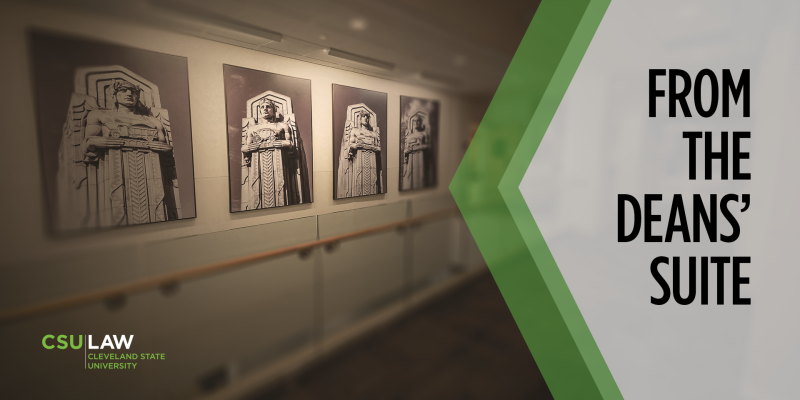
Last week, Cleveland State University College of Law joined with CSU’s new Center for Civics, Culture and Society to mark Constitution Day, the annual observance of the signing of the U.S. Constitution in 1787. Constitution Day is never simply an anniversary. It is an act of remembrance of a charter that has bound a diverse people together for more than two centuries through our ongoing commitment to the rule of law.
As part of this year’s celebration, we hosted Dr. Christina Bambrick for a discussion of her book Constitutionalizing the Private Sphere: A Comparative Inquiry. Her lecture, grounded in history and comparative constitutionalism, reminded us that debates over rights and limits are not confined to our shores. They run through all democracies, refracting the struggle to reconcile liberty, authority, and justice through the unique lens of each society's history and culture.
The event continued in seminar form, led by our own Dr. Abigail Moncrieff. What followed was a lively—at moments heated—debate over one of the oldest and most enduring questions in American law: How should judges (and should only judges) interpret the Constitution? We sparred over textualism, originalism, weak-form review, and living constitutionalism, and ultimately reached no consensus. That, of course, was the point. The Constitution endures not because it settles debate but because it channels that debate through the law.
But today, the possibility for reasoned debate over deeply held beliefs feels fragile. We are living in a moment when too often disagreements dissolve into contempt and when political violence is no longer unimaginable but all too real. We cannot ignore this reality: history teaches us that no document can hold us together if we abandon the practices of listening, reasoning, and arguing in good faith.
CSU|Law remains steadfastly committed to fostering spaces where difficult conversations can happen with rigor and respect. Our Constitution Day events were one example. This week, our Federalist Society and American Constitution Society student groups are co-hosting a debate on the Trump Administration on September 25. The very next day, our William I. Weisberg Health Law & Policy Center and Criminal Justice Center will host a conference on Weaponizing Public Health: The Role of Law and Policy in Curbing Gun Violence.
These are not easy topics. They go to the heart of the political issues that divide us. But our students, faculty, and community are engaging them head-on—because that is what it takes to fulfill the Preamble’s promise to “form a more perfect union.”
The Constitution Day debate continued through dinner and ended not with consensus but with commitment: to keep the conversation alive, to resist the pull of demonization and hatred, and to model a better way. However fierce our disagreements, we must remember that our constitutional order rests on the belief that we can govern ourselves through words rather than weapons. That is the work of law, and it has never been more urgent.
Warmly,
Brian
